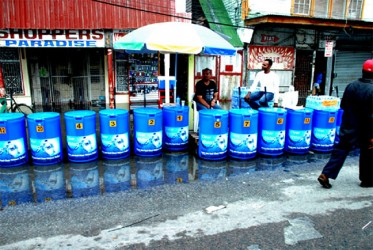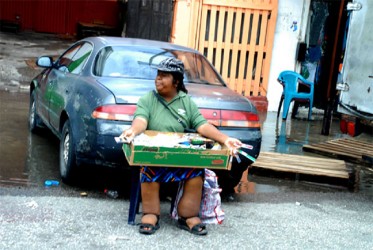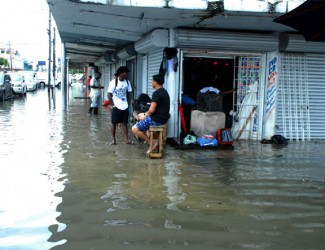The sight of the downtown street vendors, their Christmas stocks piled high, marooned atop boxes and other precarious perches, waiting for the water dumped by the early morning deluge to recede, was more than ample testimony to the folly of a city that is simply unable to get its act together as far as managing our garbage disposal and draining the city are concerned.
By afternoon, the downpour having been supplanted by sharp sun, the vendors had begun to hawk their wares from whatever vantage point they could find. The rains, however, had made their point.
For many of the downtown merchants, however, there was no trading on Wednesday. Up to late in the afternoon, water was still being removed from stores and assorted scents were being introduced to quell the stench which the water had brought with it.

Sanitation attendants operating a garbage truck on Regent Street were bringing out handfuls of dripping Styrofoam containers and bits of cardboard and plastic from a shop into which the garbage had found its way. The driver of a taxi moving gingerly along the flooded street pointed to a probable irony; the likelihood that the garbage might have been carelessly dumped by some other business owner.
Towards the western end of Regent Street and along the western half of King Street business owners and their employees were gazing dolefully into the lake, doubtless contemplating the losses that might accrue on account of a ruined trading day and the likelihood that it might have implications for their well-being. A few uniformed young women were amusing themselves watching sizeable islands of garbage float by.
In downtown Georgetown, it was obvious from around daybreak that at least for the first few hours of the trading day stores would remain closed and vendors would remain marooned. The stores had surrendered to the inevitability of their fate but the vendors would not be denied. They simply encamped on the roadway, barely safe from the brisk morning traffic.
Some of our city streets are prone to flooding. Main Street is one of them. At mid-morning, furniture giant Courts Guyana Inc was closed. The floodwaters on Main Street were lapping at the entrance. Inside had already been flooded and the store was emptying itself of water with the aid of a water pump.

Styrofoam receptacles look a thousand times more disgusting when they are discoloured and floating along in little islets, or else, clinging together at some choke point, restraining the flow of water, doing their damage both with their ugliness and by impeding the flow of water. Styrofoam containers, used to carry food then nonchalantly discarded, are an enemy of this city; and that is not necessarily an environmental comment.
A week earlier there had been a forum to discuss the banning of Styrofoam. The people who turned up seemed to have vested interests of one sort or another. Numbered amongst them were a few who had come to lobby for the retention of Styrofoam.
By midday we had begun to count the cost of the deluge. We estimated that around 40 per cent of the stores on Regent were not trading long past mid-morning. That was loss of patronage on top of having to pay workers for being idle.
A few more traders had ventured onto the roadway but it was clear that their day had been ruined. A ruined day is a big deal for most traders.
Once we attempted to do an estimate of the losses resulting from the rains we realized that that would have been impossible. We may have been able to secure an estimate of the

number of shops that remained closed and the volume of sales they might have lost. Afterwards it occurred to us that we would also have been required to account for the flood damage. That we simply could not do.
Rains usually wreak havoc at municipal markets. Greens and vegetables become vulnerable to the filth-infested waters. The vendors with whom we spoke were hopeful that mid-morning would bring some sunshine, the waters would recede and things would more-or-less return to normal. That was not to be.
There were other financial losses too. Not least the lost fares resulting from the fact that for a considerable portion of the day taxis were not operating in the south of the city.

Conversations amongst people retiring to their homes for the evening had to do with garbage, the indifference of the powers that be and the likelihood that all of this will pass without so much as a murmur as to how we can better prepare for such an eventuality when – not if but when it comes again. The sad part of all this is that people have become cynical, afflicted by a complete loss of faith in what we loosely call ‘the system,’ a system that huffs and puffs endlessly but persistently fails to focus on confronting what, in many instances, are the far from insurmountable challenges associated with mitigating the damage that is customarily inflicted by occurrences like Wednesday’s floods.








